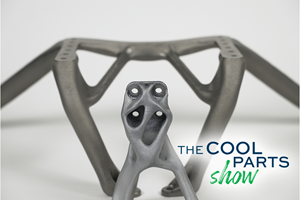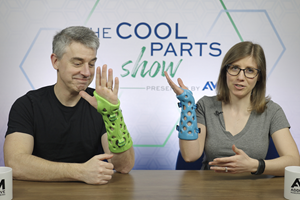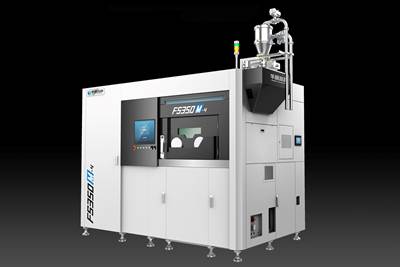Atlas 3D's Sunata AM Software Automates Orientation
The software has also been tested with QuesTek’s Ferrium C64 metal powder.
Share
Read Next
Sunata software from Atlas 3D works with direct metal laser sintering (DMLS) printers, automatically choosing the best orientation for a part, generating support structures and eliminating simulation processes.
Users download designs directly into the cloud-based program and automatically receive the optimal orientation and associated support structures. There are no servers to install and configure and no IT support is needed. Users simply import the STL file, the developer says.
The software’s thermal circuit network (TCN) ensures accuracy and speed by parsing the print design into thermally similar layers, which are then divided into thermally similar segments. It applies a thermal modeling algorithm that runs the design through 100 different orientations to arrive at the optimal orientation and support structure.
The software gives users the ability to scale their requirements from next-to-zero distortion with longer print times, to more tolerable distortion with shorter print times. Because it optimally orients and supports the part, it can give accurate total print time and the amount of sintered material required and provide accurate cost-to-print data. This information, in combination with eliminating waste and rework, enables users to profitably print their designs.
Sunata works with many metal feedstocks and has been tested with QuesTek Innovations’ Ferrium C64 (AMS 6509) metal powder. Ferrium C64 is a high-strength, high-surface hardness and highly fracture-resistant carburizable steel that also has high-temperature resistance and hardenability. It is said to achieve a surface hardness of 62-64 HRC via vacuum carburization. Leading applications for the metal powder include Bell Helicopter and Sikorsky transmission gearboxes.
Under an Army-funded Future Advanced Rotorcraft Drive System (FARDS) program, Bell and Sikorsky are evaluating and qualifying it to displace Alloy X53 (AMS 6308). Benefits would include lighter-weight gear components, increased power density of the helicopter transmission, greater temperature resistance and better pitting and corrosion resistance. In addition, QuesTek is evaluating and demonstrating Ferrium C64 for additively manufactured aerospace gears and fatigue-driven applications under an Army-funded SBIR Phase I program. Other possible applications include racing transmission gears, gears with integral bearing races, and integrally geared drive shafts that require durability, compactness, weight savings, high-temperature resistance, and high-surface fatigue resistance. It can also offer increased performance and reliability of wind turbine transmission gearboxes, reducing maintenance costs and downtime and increasing reliability.
The technology group at Indiana Technology and Manufacturing Company (ITAMCO) worked with the developers at Atlas 3D to create Sunata. It is already manufacturing components with an EOS M 290 3D printer and Sunata, and is interested in Ferrium C64. Given that the company provides open gearing and precision machining services to heavy-duty industries including aviation, energy, mining, off-highway vehicles and marine, the software and metal powder could lead to continued advancement in its AM program.
“As metal additive printing continues to grow, so too does the need to add new printable powders,” says Atlas 3D CEO Chad Barden. “The thermal characteristics of these new powders, however, present their own unique set of challenges. ITAMCO is one of many Atlas 3D customers to benefit from our forward-looking move to add this exciting new material to the list of available metals in Sunata.”
“Atlas 3D’s incorporation of Ferrium C64 steel into the Sunata system will enable others interested in C64 to more efficiently begin building components with this high-performance steel,” adds Jeff Grabowski, QuesTek’s manager of business development.
Related Content
3MF File Format for Additive Manufacturing: More Than Geometry
The file format offers a less data-intensive way of recording part geometry, as well as details about build preparation, material, process and more.
Read MoreOvercoming the Bottleneck to Customized Manufacturing: Quoting
Spokbee’s software-as-a-service platform is shaving months off of the quoting and pricing process for 3D printed and other types of configurable products.
Read More3D Printed "Evolved Structures" for NASA Exoplanet Balloon Mission: The Cool Parts Show #61
Generative design creates stiff, lightweight brackets for EXCITE mission monitoring planets orbiting other stars. The Cool Parts Show visits Goddard Space Flight Center.
Read MoreActivArmor Casts and Splints Are Shifting to Point-of-Care 3D Printing
ActivArmor offers individualized, 3D printed casts and splints for various diagnoses. The company is in the process of shifting to point-of-care printing and aims to promote positive healing outcomes and improved hygienics with customized support devices.
Read MoreRead Next
Crushable Lattices: The Lightweight Structures That Will Protect an Interplanetary Payload
NASA uses laser powder bed fusion plus chemical etching to create the lattice forms engineered to keep Mars rocks safe during a crash landing on Earth.
Read MoreBike Manufacturer Uses Additive Manufacturing to Create Lighter, More Complex, Customized Parts
Titanium bike frame manufacturer Hanglun Technology mixes precision casting with 3D printing to create bikes that offer increased speed and reduced turbulence during long-distance rides, offering a smoother, faster and more efficient cycling experience.
Read MoreProfilometry-Based Indentation Plastometry (PIP) as an Alternative to Standard Tensile Testing
UK-based Plastometrex offers a benchtop testing device utilizing PIP to quickly and easily analyze the yield strength, tensile strength and uniform elongation of samples and even printed parts. The solution is particularly useful for additive manufacturing.
Read More




















